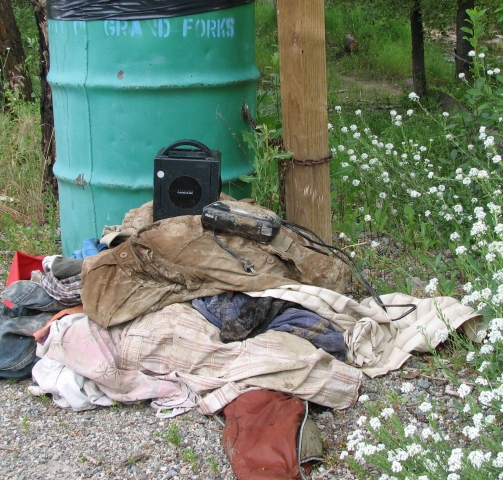Officials say free ride for squatters costs the environment
Human waste, unattended fires and toxic litter often accompanies seasonal squatters in the Boundary.
It happens every year — people who are down on their luck set up house along a river bank or in the bush to save themselves rent and utility costs while the weather is good.
Their activity may seem harmless enough but it is both illegal and environmentally damaging, say local law enforcement officials.
In May, Riverside Drive neighbours, who regularly clean-up their neighbourhood, found an abandoned camp site a young couple was living at for two weeks along the Granby River. It appeared to neighbour Kathy O’Toole they had left in a hurry one night during a storm.
“They had taken their tent and left their stuff during a deluge one night,” stated O’Toole in an email. “The river has flooded the site several times since … A sleeping bag and a few other items of clothing are still in the water as they are too heavy for me to drag out. I can only assume the garbage left behind has washed away.”
O’Toole said she and other members of the community are constantly picking up broken glass left behind by beach and trail users in addition to the garbage left behind by squatters.
Squatting an ongoing issue with downturn in economy
The squatting issue isn’t a new one, nor is it getting any easier, said Andrew Cosens, Resource Compliance Supervisor for the Kootenay Boundary region with the department of Forests, Lands and Natural Resources for the province.
“(Squatting) has expanded since the downturn in the world economy,” said Cosens. “There are more people out of work and out of luck … It is largerly seasonal. It comes and goes with the snow in this part of the world.”
Crown land can be complicated. Cosens said under the Land Act, people can not use Crown land without authorization, including to live on. On the other hand, there is the Canadian Charter of Rights and Freedoms.
“You have to strike a healthy balance between people being able to do whatever they want and what people can’t do on Crown land. We’re not a police state,”said Cosens.
Much of his involvement in squatting issues is complaint driven. If he or someone else finds squatters on Crown land, Cosens gives them 14 days to get off before he starts enforcing the Land Act.
Crown land isn’t just the forests, it includes the water, which according to the law, also belongs to the government. As does the space between the land and water called the riparian zone.
Squatting along a waterbody can introduce a deluge of substances like human waste and oils into the watershed itself and cause degradation around the riparian area or through the creek,” said Cosens.
Bud Alcock, a member of the Kettle Granby Boundary Fly Anglers, is also concerned about the health of the waterways.
“I have nothing against the squatters — just how they chose to dispose of their waste,” said Alcock. “(I’m concerned) with the disposal of raw waste such as human sewage and the dumping of plastic goods — which we target when we’re doing our clean-up.”
The anglers usually do two garbage clean-up days a year along the Granby and Kettle Rivers, especially within Grand Forks city limits. During their clean-ups, which is held in conjunction with the Grand Forks Wildlife Association, they often come across the remains of squatters sites. Four years ago when the group started their riverside clean-up they removed 740 kilograms of waste. Last year that number was down to 190 kilograms.
“We have concerns with them leaving behind litter and food garbage which can attract bears,” said Grand Forks RCMP staff sergeant Jim Harrison. “They will often have a fire, contrary to fire restrictions, which is always a concern when it is hot and dry.”
“Unauthorized fires are of concern,” agrees Cosens. “Also unauthorized harvesting of trees.”
According to Patrick Gall, Fire Information Officer with the Southeast Fire Centre, on average 50 per cent of wildfires are human caused. Of the 28 fires that have happened in our region this year, 20 of those were human caused, said Gall. If someone is found to have caused a fire they could be liable for all the surpression charges accrued to put the fire out.
While many people contact the RCMP to report illegal squatting activity, Cosens is the person to call. In the Kootenay/Boundary a natural resource officer in Grand Forks can be reached through the Ministry of Forests, Lands and Natural Resource Operations office in Grand Forks/Castlegar at 250-365-8600 and in the Nelson and Creston area at 250-825-1100. There is also a Provicinal RAPP web contact at www.env.gov.bc.ca/cos/rapp/form.htm .


























Comments